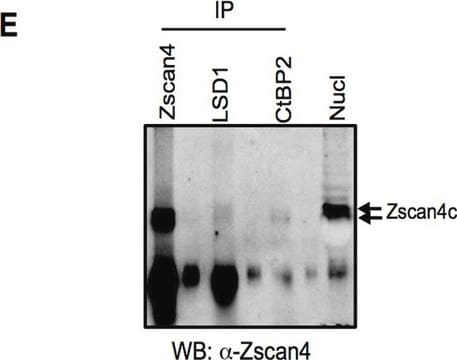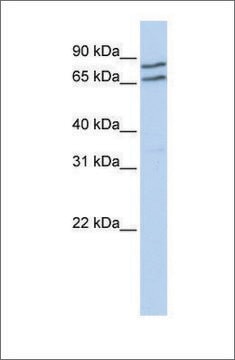SAB4200803
Anti-TFE3 antibody produced in rabbit
affinity isolated antibody, buffered aqueous solution
Synonym(s):
Anti-Class E basic helix-loop-helix protein 33, Anti-Transcription factor E3, Anti-bHLHe33
About This Item
Recommended Products
biological source
rabbit
antibody form
affinity isolated antibody
antibody product type
primary antibodies
clone
polyclonal
form
buffered aqueous solution
mol wt
~60 kDa
species reactivity
mouse, human
packaging
antibody small pack of 25 μL
concentration
~1.0 mg/mL
technique(s)
immunoblotting: 4-8 μg/mL using human HeLa cells extract
immunofluorescence: 2.5-5 μg/mL using mouse embryo fibroblast NIH-3T3 cells
1 of 4
This Item | SAB2102412 | SAB5700877 | SAB4502952 |
|---|---|---|---|
| biological source rabbit | biological source rabbit | biological source rabbit | biological source rabbit |
| form buffered aqueous solution | form buffered aqueous solution | form liquid | form buffered aqueous solution |
| technique(s) immunoblotting: 4-8 μg/mL using human HeLa cells extract, immunofluorescence: 2.5-5 μg/mL using mouse embryo fibroblast NIH-3T3 cells | technique(s) western blot: suitable | technique(s) immunohistochemistry: 1:50-1:200, western blot: 1:500-1:2000 | technique(s) ELISA: 1:20000, immunohistochemistry: 1:50-1:100, western blot: 1:500-1:1000 |
| storage temp. −20°C | storage temp. −20°C | storage temp. −20°C | storage temp. −20°C |
| shipped in dry ice | shipped in wet ice | shipped in wet ice | shipped in wet ice |
General description
Anti-TFE3 antibody specifically recognizes TFE3 from human and mouse origin.
Immunogen
Application
Physical form
Other Notes
Not finding the right product?
Try our Product Selector Tool.
Storage Class Code
10 - Combustible liquids
WGK
WGK 3
Flash Point(F)
Not applicable
Flash Point(C)
Not applicable
Certificates of Analysis (COA)
Search for Certificates of Analysis (COA) by entering the products Lot/Batch Number. Lot and Batch Numbers can be found on a product’s label following the words ‘Lot’ or ‘Batch’.
Need A Sample COA?
This is a sample Certificate of Analysis (COA) and may not represent a recently manufactured lot of this specific product.
Already Own This Product?
Find documentation for the products that you have recently purchased in the Document Library.
Our team of scientists has experience in all areas of research including Life Science, Material Science, Chemical Synthesis, Chromatography, Analytical and many others.
Contact Technical Service










